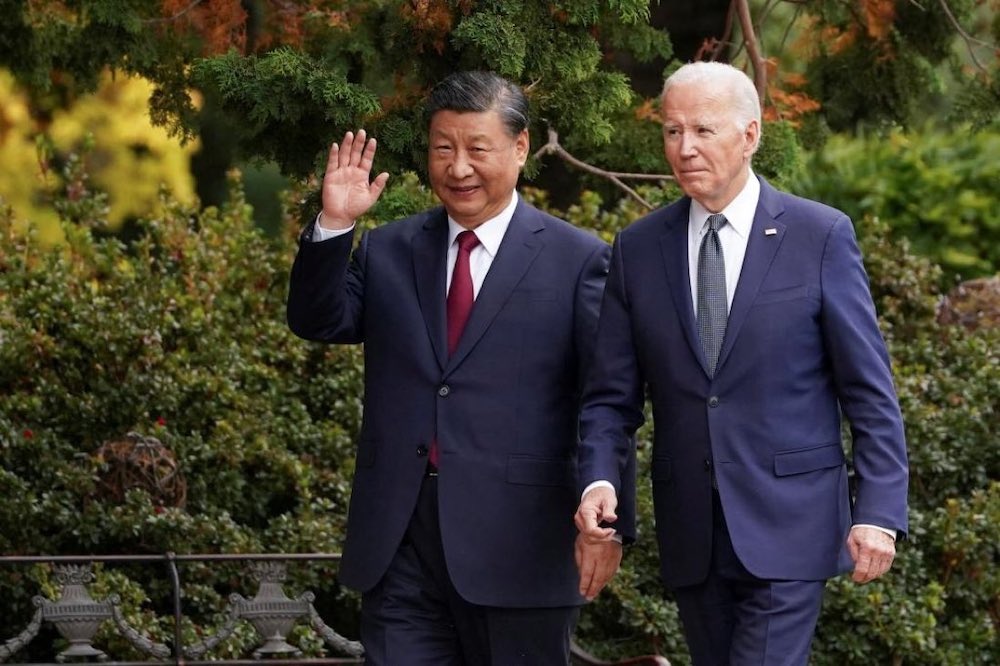Politics
REPORT: Xi Jinping Boldly Tells Biden That China Plans To Take Taiwan

In a recent high-profile summit in San Francisco, Chinese President Xi Jinping conveyed a direct message to President Joe Biden regarding the future of Taiwan, a matter that has long been a source of tension in U.S.-China relations. During the meeting, Xi made it unequivocally clear that China is committed to the reunification of Taiwan with mainland China.
Xi’s declaration did not include a specific timeline for this reunification. The Chinese leader’s comments were reported by multiple sources. The summit which lasted four hours, saw Jinping label Taiwan as the most significant and potentially dangerous issue in the bilateral relationship between the United States and China.
Moreover, Jinping expressed his preference for a peaceful reunification with Taiwan, rather than resorting to force.
WATCH:
Officials who knew about the talk between Biden and Xi characterized the Chinese leader as straightforward and honest, yet not aggressive. They told NBC News, “his language was no different than what he has always said. He is always tough on Taiwan. He’s always had a tough line,” mentioned a U.S. official informed about the discussion.
“This story as reported is beyond unnerving,” Lindsey Graham (R-SC) said. “I will be working with Democratic and Republican Senators to do two things quickly. First, create a robust defense supplemental for Taiwan and second, draft pre-invasion sanctions from hell to impose on China if they take action to seize Taiwan.”
The situation involving Taiwan, China, and the United States is a complex and long-standing geopolitical issue. The core of the problem dates back to the Chinese Civil War, which concluded in 1949. The conflict resulted in the Communist Party establishing the People’s Republic of China (PRC) on the mainland, while the Nationalist government, defeated in the war, retreated to Taiwan and set up its own government.
For many years, both governments claimed to be the legitimate government of all China. Over time, the PRC has gained widespread international recognition and considers Taiwan a part of its territory, a claim that is a significant point of contention.
The United States plays a crucial role in this dynamic. Initially, the U.S. recognized the government in Taiwan as the legitimate government of China. However, in 1979, the U.S. switched diplomatic recognition to the PRC while maintaining a significant, though unofficial, relationship with Taiwan.
The U.S. has continued to be a major supporter of Taiwan, especially in terms of military and economic aid, which has been a source of tension with the PRC. The U.S. follows a policy of “strategic ambiguity” regarding Taiwan’s defense, which means it doesn’t explicitly state whether it would defend Taiwan in the event of a Chinese attack.
This situation is further complicated by Taiwan’s evolving identity and its vibrant democracy, with many of its citizens viewing Taiwan as a distinct entity from the PRC. The PRC, however, views any move by Taiwan towards formal independence as unacceptable and has not ruled out the use of force to bring Taiwan under its control.
The U.S., while supporting Taiwan’s democracy, treads a careful line to avoid escalating tensions with China. This precarious balance of power and diplomacy makes the Taiwan-China-USA relationship one of the most sensitive and potentially volatile international issues.
The U.S. has traditionally supported Taiwan, albeit with a careful balance, and any shift in this policy could have far-reaching implications. Xi’s assertive stance on reunification and the absence of a defined timeline for action add elements of both clarity and uncertainty to an already delicate international issue.
In October, Jinping declared that the Communist Party of China (CPC) is committed to enacting its comprehensive strategy for addressing the Taiwan issue in the current era, steadfastly progressing towards the goal of national unification.
“Resolving the Taiwan question is a matter for the Chinese, a matter that must be resolved by the Chinese,” Xi stated during the inaugural meeting of the 20th CPC National Congress.
“We will continue to strive for peaceful reunification with the greatest sincerity and the utmost effort, but we will never promise to renounce the use of force, and we reserve the option of taking all measures necessary. This is directed solely at interference by outside forces and the few separatists seeking ‘Taiwan independence’ and their separatist activities; it is by no means targeted at our Taiwan compatriots,” he said.

